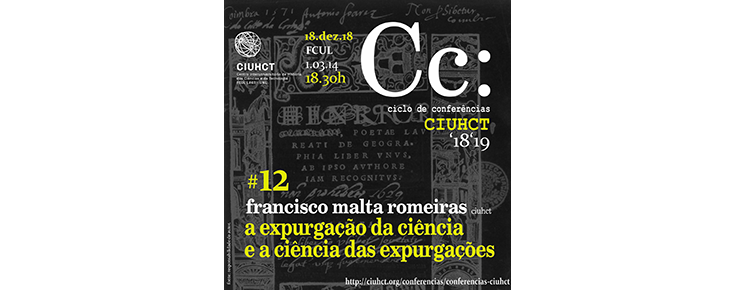
Através da publicação periódica do Index Librorum Prohibitorum e de visitas a navios, livrarias e bibliotecas, a Inquisição controlava a venda, posse e leitura de obras proibidas no império português. No caso de obras que tratavam de matérias científicas, os tópicos mais visados pela censura inquisitorial foram a medicina, a filosofia natural, a astrologia e as artes divinatórias. Tomando como ponto de partida os autores e obras científicas condenadas nos Índices portugueses e a coleção de livros proibidos da Biblioteca Nacional de Portugal, esta comunicação pretende chamar a atenção para a importância de se usarem novos métodos e de se estabelecer uma tipologia das expurgações para uma melhor compreensão do papel da Inquisição na censura de obras científicas.
The Expurgation of Science and the Science of Expurgating
During the sixteenth and seventeenth centuries, the Portuguese Inquisition was responsible for the publication of the Index Librorum Prohibitorum and for ascertaining its actual implementation in the Portuguese empire. Throughout the centuries, the criteria for censorship was subject to very few changes. In the case of science books and authors, the Portuguese Index condemned some works of medicine, natural philosophy, astrology, and divinatory arts. By examining the material evidence of censorship’s mechanisms in the collection of the Portuguese National Library, this paper reveals the processes and effectiveness of expurgation and highlights the differences between what inquisitors wrote in the Index and what others put into practice.
Biografia: Francisco Malta Romeiras (Lisboa, 1986) é licenciado em Bioquímica, mestre em Bioquímica Médica e doutorado em História e Filosofia das Ciências pela Universidade de Lisboa. É membro do Centro Interuniversitário de História das Ciências e Tecnologia (CIUCHT-Universidade de Lisboa) desde 2011. Em 2017 foi Senior Research Fellow no Institute for Advanced Jesuit Studies (Boston College). A sua investigação tem-se focado na história do ensino e da prática das ciências nos colégios dos jesuítas (séculos XVIII–XX) e no papel desempenhado pela Inquisição na censura de obras e autores científicos (séculos XVI–XVII). Membro do conselho editorial da revista Brotéria desde Janeiro de 2013, coordenou com Henrique Leitão a edição da Obra Selecta do Padre Luís Archer S.J., 4 vols. (Lisboa: Fundação Calouste Gulbenkian, 2015–2017). Em 2015, o seu livro Ciência, Prestígio e Devoção: Os Jesuítas e a Ciência em Portugal (séculos XIX e XX) (Cascais: Lucerna, 2015), foi distinguido com uma Menção Honrosa na 24ª Edição do Prémio Victor de Sá de História Contemporânea. Recentemente, publicou Os jesuítas em Portugal depois de Pombal. História ilustrada (Cascais: Lucerna, 2018).
É membro de diversas sociedades científicas internacionais incluindo a Renaissance Society of America, a History of Science Society, a British Society for the History of Science e a Société Internationale d’Études Jésuites.
Francisco Malta Romeiras works at the Department of History and Philosophy of Science at the University of Lisbon. His research interests include the history of science in Portugal, the history of Jesuit science and education, and the history of book censorship. Former Senior Research Fellow at the Institute for Advanced Jesuit Studies, Boston College, he has been working on the publication of a monograph on Jesuit science and education in modern Portugal entitled Jesuits and the Book of Nature. His works have appeared in History of Science, Journal of the History of Science and Technology, Archivum Historicum Societatis Iesu, Journal of Jesuit Studies, and Brotéria. Recently, he edited with Henrique Leitão the selected works of the molecular geneticist and Jesuit scientist Luís Archer: Obra selecta do Padre Luís Archer, S.J., 4 vols. (Lisbon: Fundação Calouste Gulbenkian, 2015–2017) and published an illustrated history of the Jesuits in Portugal after their official return in 1858: Jesuítas em Portugal depois de Pombal. História ilustrada (Cascais: Lucerna, 2018). Currently, most of his time is spent on a project on the circulation and censorship of scientific books in the sixteenth and seventeenth centuries. He has been serving as a member of the editorial board of the Jesuit journal Brotéria since 2013.

